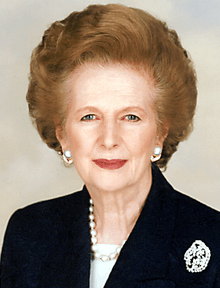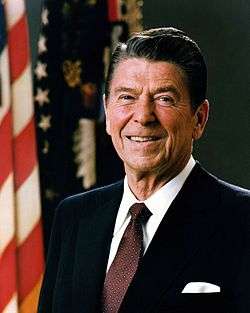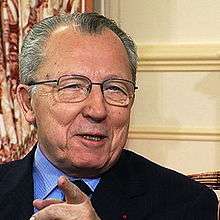14th G7 summit
| 14th G7 summit | |
|---|---|
|
Metro Toronto Convention Centre, Front Street entrance | |
| Host country | Canada |
| Dates | June 19–20, 1988 |
| Venue(s) | Metro Toronto Convention Centre |
| Cities | Toronto, Ontario |
| Follows | 13th G7 summit |
| Precedes | 15th G7 summit |
The 14th G7 Summit was held in Toronto, Ontario, Canada between June 19 and 21, 1988. The venue for the summit meetings was the Metro Toronto Convention Centre in central Toronto.[1]
The Group of Seven (G7) was an unofficial forum which brought together the heads of the richest industrialized countries: France, West Germany, Italy, Japan, the United Kingdom, the United States, Canada (since 1976)[2] and the President of the European Commission (starting officially in 1981).[3] The summits were not meant to be linked formally with wider international institutions; and in fact, a mild rebellion against the stiff formality of other international meetings was a part of the genesis of cooperation between France's President Giscard d'Estaing and West Germany's Chancellor Helmut Schmidt as they conceived the first Group of Six (G6) summit in 1975.[4]
Unlike the relatively low key summit at Château Montebello in 1981, the Toronto summit was held under tight security with involvement of the Royal Canadian Mounted Police (RCMP) and Metro Toronto Police.
Canada was the first member of the G7/G8 to host both this kind of Summit and an Olympic Games in the same calendar year. In February, Calgary, Alberta, hosted the 1988 Winter Olympics. Canada would do this again 22 years when they hosted the Winter Olympics in Vancouver, British Columbia and then the G8 Summit in Huntsville, Ontario.
Leaders at the summit

The G7 is an unofficial annual forum for the leaders of Canada, the European Commission, France, Germany, Italy, Japan, the United Kingdom and the United States.[3]
The 14th G7 summit was the first summit for Italian Prime Minister Ciriaco De Mita and was the last summit for U.S. President Ronald Reagan.[5] It was also the first and only summit for Japanese Prime Minister Noboru Takeshita.
Core G7 participants
These summit participants are the current "core members" of the international forum:[6]
| Core G7 members Host nation and leader are indicated in bold text. | |||
| Member | Represented by | Title | |
|---|---|---|---|
| |
Canada | Brian Mulroney [1] | Prime Minister |
| |
France | François Mitterrand [1] | President |
| |
West Germany | Helmut Kohl [1] | Chancellor |
| |
Italy | Ciriaco de Mita [1] | Prime Minister |
| |
Japan | Noboru Takeshita [1] | Prime Minister |
| |
United Kingdom | Margaret Thatcher [1] | Prime Minister |
| |
United States | Ronald Reagan [1] | President |
| |
European Commission | Jacques Delors [7] | President |
Issues
The summit was intended as a venue for resolving differences among its members. As a practical matter, the summit was also conceived as an opportunity for its members to give each other mutual encouragement in the face of difficult economic decisions.[4] Issues which were discussed at this summit included:
- International Economic Policy Cooperation
- Multilateral Trading System / Uruguay Round
- Newly Industrialized Economies
- Developing Countries and Debt
- Environment
- Future Summits
- Other Issues
- Annex on Structural Reform
Gallery
-
 Canada
Canada
Brian Mulroney, Prime Minister -
.jpg)
 France
France
François Mitterrand, President -
.jpg)
 Germany
Germany
Helmut Kohl, Chancellor -

 Italy
Italy
Ciriaco de Mita, Prime Minister -

 Japan
Japan
Noboru Takeshita, Prime Minister -

 United Kingdom
United Kingdom
Margaret Thatcher, Prime Minister -

 United States
United States
Ronald Reagan, President -

 European Union
European Union
Jacques Delors, Commission President
See also
Notes
- 1 2 3 4 5 6 7 8 Japan, Ministry of Foreign Affairs (MOFA): Summit Meetings in the Past.. Accessed 2009-03-11. Archived 2009-04-30.
- ↑ Saunders, Doug. "Weight of the world too heavy for G8 shoulders," Globe and Mail (Toronto). July 5, 2008 -- n.b., the G7 becomes the Group of Eight (G7) with the inclusion of Russia starting in 1997.
- 1 2 Reuters: "Factbox: The Group of Eight: what is it?", July 3, 2008.
- 1 2 Reinalda, Bob; Verbeek, Bertjan (1998). Autonomous Policy Making by International Organizations. p. 205.
- ↑ Kurtaman, Joel. "Business Forum: Reagan's Final Summit Conference; The Forecast Is for All Talk, No Action," New York Times. June 19, 1988.
- ↑ Rieffel, Lex. "Regional Voices in Global Governance: Looking to 2010 (Part IV)," Archived June 3, 2010, at the Wayback Machine. Brookings. March 27, 2009; "core" members (Muskoka 2010 G-8, official site). Archived June 2, 2010, at the Wayback Machine.
- ↑ MOFA: Summit (14); European Union: "EU and the G8"
References
- Bayne, Nicholas and Robert D. Putnam. (2000). Hanging in There: The G7 and G8 Summit in Maturity and Renewal. Aldershot, Hampshire, England: Ashgate Publishing. ISBN 978-0-7546-1185-1; OCLC 43186692
- Reinalda, Bob and Bertjan Verbeek. (1998). Autonomous Policy Making by International Organizations. London: Routledge. ISBN 978-0-415-16486-3; ISBN 978-0-203-45085-7; OCLC 39013643
External links
- No official website is created for any G7 summit prior to 1995 -- see the 21st G7 summit.
- University of Toronto: G8 Research Group, G8 Information Centre
- CBC Digital Archives: "Leaders arrive at 1988 G7 Summit in Toronto," Broadcast Date: June 18, 1988.